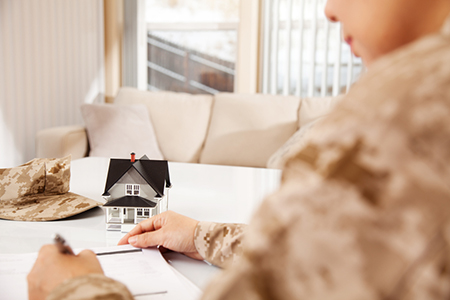(TNS)—If you or your spouse has served in the military or the National Guard, chances are you’re eligible for a loan guaranty from the U.S. Department of Veterans Affairs.
“VA loans are a low risk for lenders and a great benefit for veterans,” says Patrick Cunningham, vice president and partner at Home Savings and Trust Mortgage in Fairfax, Va.
The Department of Veterans Affairs reports that more than 631,000 loans for veterans were approved in 2015.
The VA loan guaranty program, part of the 1944 GI Bill of Rights, was designed to ease the transition of veterans into civilian life while also spurring the U.S. economy, says Louise Thaxton, branch manager of Fairway Independent Mortgage Corp. in Leesville, La.
Who Can Finance a Home with a VA Loan
Many veterans pay attention to their education and medical benefits but are unaware that they may qualify for this homeownership benefit, says Joseph J. Murin of NewDay USA, a VA mortgage lender based in Fulton, Md.
Members of the military are eligible for a VA loan guaranty after they have actively served for 90 days during wartime or 180 days during peacetime. Murin says members of the National Guard and reservists are eligible after six years or, if they have been called for active service during wartime, 90 days. Surviving spouses of someone who died during active duty or due to a service-related disability are also eligible.
Criteria for VA financing also includes meeting loan guidelines for credit and income eligibility.
While Thaxton says that typically with a VA loan a co-borrower’s income can be considered only if the borrowers are married, two veterans who aren’t married can get a VA loan together. A veteran who wants to buy with a non-spouse, non-veteran co-borrower must make a down payment of at least 12.5 percent.
Loans for veterans are generally available for primary residences only.
Why Choose VA?
Borrowers can finance 100 percent of their home purchase.
“Not only is there no down payment requirement, but eligible borrowers don’t pay mortgage insurance as they would with any (Federal Housing Administration) loan or with a conventional mortgage with a down payment of less than 20 percent,” says Cunningham.
Loans for veterans typically have interest rates comparable to the best conventional loan rates, he says.
“There’s no rate adjustment for a lower credit score, so for someone with a low score that could mean as much as a 1 percent difference on a conventional loan,” says Cunningham. “The funding fee for the program pays for a government guarantee to protect lenders in case of a default.”
Funding fees range from 1.25 percent to 2.4 percent for first-time VA loan borrowers.
“VA loans are underwritten specifically for veterans and rely on more than just a credit score,” says Murin. “We focus mostly on the disposable income of the borrowers since that’s the biggest indicator of whether someone will default.”
When Should You Use a VA Loan?
You can use your eligibility multiple times, says Thaxton.
You can even have more than one VA loan at a time, depending on how much of your eligibility you used the first time.
“The funding fee will be higher when you take out a second VA loan, sometimes as high as 3.3 percent,” says Thaxton.
“Most of our borrowers are refinancing a VA loan with a cash-out refinance to consolidate their debt,” says Murin. “Our older borrowers benefit from this opportunity to clean up their finances.”
But the 3.3 percent funding fee can be cost-prohibitive for veterans refinancing from an FHA or conventional loan into a VA loan, says Cunningham.
A VA loan expert can help you compare other loan options and decide whether the funding fee is costlier than paying mortgage insurance, says Thaxton.
Where Can You Use a VA Loan?
While loans for veterans are available throughout the U.S. for properties with one to four units, the limits on the loans vary according to housing costs in your county. The VA loan limits conform to the limits for conventional financing established by the Federal Housing Finance Agency. The limit is $417,000 in most areas and up to $625,500 in high-cost housing markets.
“The ability to buy a house for as much as $625,500 in the D.C. area without a down payment is a great benefit for vets,” says Cunningham. “In addition, if you want to use a jumbo VA loan and buy a more expensive property, you just have to make a down payment of 25 percent of the difference between the home price and the loan limit.”
For example, buyers of a $700,000 home would need to pay 25 percent of $74,500 (the difference between $700,000 and $625,500), or $18,625, a significant savings compared with a traditional jumbo loan. A 5 percent down payment on a $700,000 loan would be $35,000.
How to Apply
The first step for borrowers is to obtain a certificate of eligibility for a VA loan through the VA office or a lender. Next, borrowers need to find a lender experienced with VA loans.
“It’s important to find a lender experienced with VA loans who can also be an advocate for the veteran,” says Murin.
Borrowers can work with a lender to decide how to pay the funding fee, which varies depending on your service and the amount of the down payment, if any.
Some disabled veterans can get the fee waived, says Cunningham.
Once borrowers have a loan pre-approval, they can begin looking for a home to buy and make an offer. Loans for veterans require a VA appraisal and a VA home inspection to make sure the property is priced appropriately and is habitable.
Up to 4 percent of closing costs can be paid by the seller, says Cunningham.
©2016 Bankrate.com
Distributed by Tribune Content Agency, LLC.











